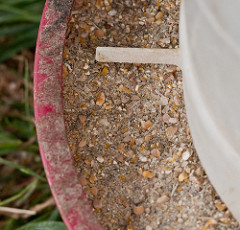Regardless of the “nutritional benefits” debate – many would agree that good organic produce is better for the environment because it doesn’t use harmful petro-chemicals and pesticides – and that it just tastes better!
But how can you tell if your organic food really is organic? Australian certification standards appear to be more confusing than most – and in many ways they are!
Unlike other countries, such as the US, the EU or Japan, Australia actually has no domestic standards for organic produce within Australia. As a result, our certification process is run by independent third parties, not the Federal Government or any Minister department.
The Government does have a leg in organics certification process through the Australian Quarantine and Inspection Service (AQIS). Certifying bodies need to register with the AQIS in order for their products to be exported as organic.
Essentially, what this means it that there 7 different certification bodies in Australia, all equally recognized by the Federal Government as the other! The Organic Federation of Australia recommends that companies looking for organic certification should contact all relevant certification bodies to compare costs and varying standards to find the most suitable certification.
Meanwhile, industry stakeholders are working on developing a more comprehensive national standard for organic certification across the board. Standards Australia, the largest non-government standards organization released its draft organic standard for review last year. The organization anticipates releasing its final organic standard in the coming months. However, this standard will be voluntary and it will be up to certifying bodies to decide adapt the standard.
So what do I look for?
Ultimately, a certification’s credibility stems from the government registration as well as recognition in the marketplace. Businesses that are looking to certify and customers looking to buy real Australian organic products should refer to the Certified Organic Labels below.
Australian Certified Organic (ACO) aka the “bud logo”
Supported by the Biological Farmers Association (BFA). ACO is likely the most popular most recognized organic certification standard in Australia with over 1500 certified operators.
Organic Growers of Australia
Supported by the BFA, OGA certification is available for small growers who supply produce to domestic markets. The OGA is not accredited by AQIS since registered producers are not qualified for export. The accreditation’s credibility comes from its management by the BFA.
The National Association for Sustainable Agriculture, Australia (NASAA)
Another well recognized organic certification standard with over 1000 certified operators.
Demeter Bio Dynamic Certification
In a nutshell, farmers that engage in biodynamic practices take ecological consideration a step further, embracing the popular teaching of Rudolf Steiner. Requirements for certification are usually more demanding than most organic considerations. Demeter offers strictly biodynamic certification for its products and is the oldest recognized certification body among the registered groups.
AUS-QUAL Limited
Based in Queensland, AUS-QUAL is also accredited to perform certification activities offers an AUS QUAL certified organic certification and the USDA under the US National Organic Program (NOP).
Organic Food Chain
Offers an OFC certification as well as USDA Organic certification, Japan JAS Organic certification for Australian produced products.
Safe Food Queensland
Run by the Queensland government, Safe Food oversees food safety in the production of the dairy, eggs, meat and seafood industries.
Tasmania Certified Organic
Organic certification available to Tasmanian growers, with over 40 locally registered certified operators.
Find more organic food and eco friendly living tips at the Green Pages.
Find More Certified Organic Articles

